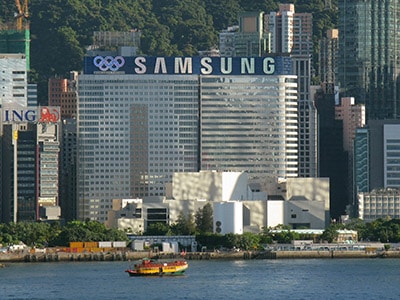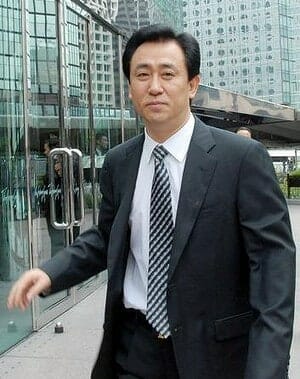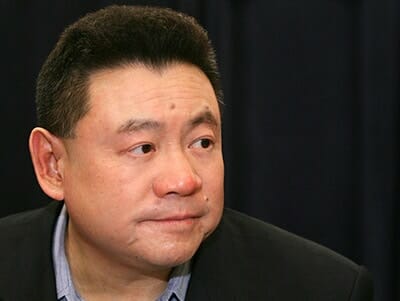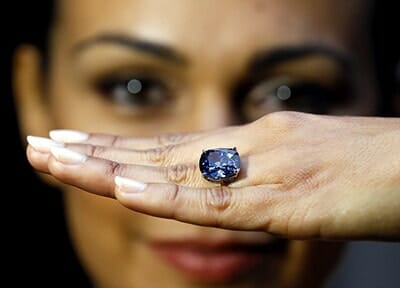
Evergrande doubled the existing HK record for an office building, by paying HK$12.5 billion for Mass Mutual Tower
China’s Evergrande Real Estate set a new record for acquisition of a Hong Kong office building last week by purchasing the Mass Mutual Tower in Wanchai from Joseph Lau’s Chinese Estates for HK$12.5 billion ($1.61 billion).
The sale of the 26-storey grade A building on Gloucester Road, which was announced to the stock exchange late on Thursday, was the third time that Lau, who is currently a fugitive from a graft conviction in Macau, has sold a major property to Evergrande this year.
Lau, who was sentenced to a five year and three months jail term for bribery by a Macau court last year, is expected to receive a special dividend from this latest sale to China’s most indebted real estate developer, and the tycoon seems to have already put some of the proceeds to work by purchasing a $48 million blue diamond for his seven-year-old daughter.
Mass Mutual Tower is Hong Kong’s Biggest Sale Ever

Xu Jiayin’s Evergrande has purchased more than HK$20 billion in property from Chinese Estates this year.
Evergrande, which is run by high profile billionaire Xu Jiayin (also known by his Cantonese name Hui Ka-yan), set a record for the most expensive purchase of an office building in Hong Kong when it outbid two state-run Chinese firms for the office building. The price more than doubled the previous high water mark for a Hong Kong office, set last year when Citigroup bought a building in from Wheelock and Company for HK$5.4 billion.
In the wake of Chinese Estate’s blockbuster sale, Wheelock had to settle for setting a new Kowloon record on Thursday, when it sold an uncompleted commercial property in Hung Hom to mainland insurer China Life for $755 million.
The Mass Mutual Tower deal also set a new mark for the highest price per square foot in Hong Kong (HK$36,232), surpassing the HK$35,000 that Hopewell Holdings secured for sale of a floor in 9 Queen’s Road in May this year.
“Immature Capital Management”
As announced to the Hong Kong Stock Exchange, Evergrande, which already carries more debt on its balance sheet than any other mainland developer, will pay HK$1.25 billion up front for the building, and will be required to pay the balance over the next six years.
The blockbuster deal did not sit well with investors, who pummeled Evergrande’s stock down by as much as 3.98 percent during Friday’s trading. Analysts also criticised the deal with JP Morgan, who calculated that it provided a measly 1.7 percent yield, stating in a note to investors that the deal was “another example of immature capital management” by Evergrande.
The transaction provides Chinese Estates with a healthy return on its investment, with the developer having purchased part of the building in 1987 for HK$60 million, and completed its acquisition of the property in 1991 for HK$500 million, according to an account in Ejinsight.com.
Evergrande Purchases HK$20.75B in Property from Chinese Estates

Chinese Estates’ Joseph Lau won’t be visiting Macau again anytime soon
This latest deal acquisition by Evergrande comes after the top-five mainland developer dove deeper into debt to purchase a number of development sites from companies controlled by Lau earlier this year, and brings total transactions between the two parties to HK$20.75 billion ($2.68 billion) in 2015.
In October, Evergrande spent HK$7 billion ($903 million) to buy a 205,000 square metre project in Chongqing, in southwestern China, from three Hong Kong developers, including Chinese Estates. For its 25 percent stake in the Chongqing project, Lau’s company received HK$1.75 billion in cash.
The Chongqing deal was preceded in July by Evergrande’s HK$6.5 billion ($839 million) acquisition of three development projects in Chengdu, Sichuan province from Chinese Estates subsidiary Evergo Holdings (China). The Chengdu acquisition was criticised by Moody’s as hurting Evergrande’s credit, with the ratings agency pointing to Evergrande’s “notable increase in short-term debt over the last two years.”
Turning Office Blocks into Blue Moons

Joseph Lau bought the Blue Moon 12.03 carat for his seven-year-old daughter
While Evergrande’s Xu is known for his aggressive management of his balance sheet, the mainland real estate personality pales compared to the notoriety that Lau has achieved in Hong Kong.
Thanks to the lack of an extradition treaty between Hong Kong and Macau, the billionaire has avoided serving his jail term for bribery (which stemmed from a development deal in the gaming haven), but has gained a reputation for providing himself with special compensation for deals conducted by his publicly listed company.
Lau, who owns just under 75 percent of the shares in Chinese Estates, has paid himself special dividends totaling about HK$14 billion from other asset sales in recent months, and some analysts have speculated that the tycoon could reap billions more from dividends from this latest sale.
Whatever the size of the potential dividend, Lau appeared to be in a spending mood on Wednesday, a day before the Mass Mutual Tower deal was announced, when he paid a record $48.4 million to purchase a 12.03 carat blue diamond, known as the Blue Moon, at an auction in Geneva, according to an account in Bloomberg.
According to Lau, he purchased the blue diamond, which he renamed “The Blue Moon of Josephine” for his seven-year-old daughter Josephine. Just one day earlier he had paid $28.53 million for a pink diamond, which he also presented to his daughter.
Leave a Reply